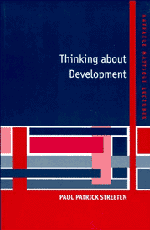FIRST LECTURE
The Evolution of Development Thought
Published online by Cambridge University Press: 05 February 2015
Summary
Introduction
I have, in the past, written on the evolution of development thought from different perspectives. Several early essays are on the historical evolution of our thinking. A later one took various dichotomies as a starting point and examined how they fit together. A subsequent essay combined history, analysis and policy by trying to show how the successful solution of one set of problems leads to new problems to be investigated. In this lecture I want to trace some ideas according to their scope and limitations of applicability.
In this post-Keynesian, post-industrial, post-ideological age, the field of development is very wide; indeed, it is much wider than economics itself. My survey will therefore have to be highly selective. I shall not say anything about the economics of information and communication, rational expectations, the service economy, game theory, asset pricing, taxation, public economics or the important subject of participation.
Sometimes one is asked to peer into the future and predict the next intellectual breakthrough. But such requests are asking for the logically impossible. For if I knew what the next breakthrough was going to be, I would already have accomplished it, and it would be the latest breakthrough. I shall therefore refrain from such forecasts, although I shall occasionally point to areas in need of further research.
- Type
- Chapter
- Information
- Thinking about Development , pp. 5 - 84Publisher: Cambridge University PressPrint publication year: 1995



